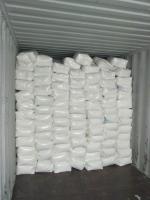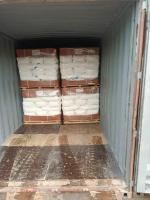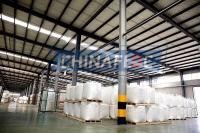Main Application of Cationic Flocculant Emulsion CORE SHELL 71305
Introduction
CORE SHELL™ 71305 is a cationic polyacrylamide-based flocculant emulsion manufactured by Nalco (Ecolab). It belongs to the advanced CORE SHELL™ polymer family, which features a unique molecular design that enhances flocculation efficiency, durability of flocs, and performance across a wide range of water chemistries. The cationic charge of CORE SHELL™ 71305 makes it especially effective for binding and destabilizing negatively charged particles commonly found in municipal sludge, industrial effluents, and certain mining residues.
The main application of CORE SHELL™ 71305 is in sludge dewatering and wastewater treatment, where it provides superior solid–liquid separation, improved sludge cake dryness, and reduced disposal costs. While its primary role lies in sludge management, the product also finds use in papermaking, food processing, and select mineral processing operations that require cationic polymers.
1. Municipal Wastewater Treatment – Sludge Dewatering
The central application of CORE SHELL™ 71305 is sludge conditioning before mechanical dewatering in wastewater treatment plants.
-
Why sludge needs treatment: Municipal wastewater treatment generates large volumes of biological sludge from primary and secondary processes. This sludge contains 95–99% water and is difficult to handle in its raw state.
-
Role of the cationic flocculant: CORE SHELL™ 71305 neutralizes the negative charges on sludge particles, promoting aggregation into large, dense flocs. These flocs release water more readily when subjected to mechanical dewatering equipment.
Benefits in Dewatering Equipment
-
Centrifuges: Produces stable flocs that resist shear, leading to higher cake dryness and clearer centrate.
-
Belt Filter Presses: Improves drainage through the belt fabric, reducing polymer dosage and improving throughput.
-
Screw Presses: Enhances solids capture, producing a drier, less odorous sludge cake.
-
Plate and Frame Filter Presses: Reduces cycle times, increases solids loading, and lowers operational costs.
By improving sludge dryness, CORE SHELL™ 71305 reduces sludge transport and disposal costs, which often represent the largest share of wastewater treatment expenses.
2. Industrial Wastewater Treatment
CORE SHELL™ 71305 is also widely applied in industrial wastewater treatment, especially in sectors that generate high loads of organic matter and fine suspended solids.
-
Food and Beverage Industry: Meat processing, dairy, breweries, and sugar plants produce effluents rich in organic solids. CORE SHELL™ 71305 aids in clarifying wastewater and conditioning sludge for easier dewatering.
-
Pulp and Paper Industry: Acts as a sludge treatment aid and improves clarification in recovery and effluent streams.
-
Chemical and Petrochemical Plants: Neutralizes colloidal organic matter, supporting efficient separation before discharge or reuse.
-
Textile and Dyeing Industries: Effective for separating color bodies and suspended organic matter from effluents.
In these industries, the polymer not only improves dewatering but also ensures compliance with increasingly strict effluent quality standards.
3. Mining and Mineral Residue Management
Although anionic flocculants are more common in mining, certain tailings streams and slurries contain organic matter or fine clays with strong negative charges. In such cases, cationic products like CORE SHELL™ 71305 provide targeted performance.
-
Coal Preparation Plants: Improves thickening and water recycling from fine coal slurries.
-
Clay-rich Tailings: When negatively charged clay particles are dominant, cationic flocculants enhance settling and reduce turbidity.
However, compared to anionic variants, the role of CORE SHELL™ 71305 in mining is secondary, mainly reserved for specific slurry chemistries.
4. Papermaking Applications
In papermaking, CORE SHELL™ 71305 functions as both a retention and drainage aid:
-
Retention of Fillers and Fines: Improves capture of negatively charged fillers like clay and calcium carbonate within the paper web.
-
Drainage Enhancement: Accelerates water release on the wire section, allowing higher machine speeds and improved energy efficiency.
-
Sludge Handling: Paper mills generate fibrous sludge that benefits from cationic flocculation prior to dewatering.
Its dual role in retention and sludge management makes it highly valued in integrated paper mill wastewater systems.
5. Environmental and Energy Benefits
The unique core–shell molecular design of CORE SHELL™ 71305 brings several performance and environmental advantages over conventional cationic polyacrylamides:
-
Lower Dosage Requirements – Its enhanced molecular architecture improves charge distribution and bridging, meaning less polymer is needed for the same performance.
-
Stronger Flocs – The flocs formed are resistant to shear, ensuring stable operation in high-speed centrifuges and other demanding equipment.
-
Improved Water Recovery – Cleaner filtrate or centrate allows for reuse of water in treatment plants or industrial processes.
-
Reduced Environmental Impact – Lower polymer consumption and reduced sludge volumes minimize chemical footprint and waste management costs.
-
Operational Reliability – Provides consistent results across variable sludge conditions, improving plant stability and compliance with regulations.
6. Practical Application Considerations
To maximize the performance of CORE SHELL™ 71305, several practical aspects must be considered:
-
Polymer Activation: As an emulsion polymer, it requires proper dilution and activation before dosing. Poor mixing can reduce efficiency.
-
Dosage Optimization: Site-specific jar testing is essential to determine the optimal dosage, as overdosing can lead to restabilization of particles.
-
Combination with Coagulants: Often paired with inorganic coagulants like alum, ferric chloride, or polyaluminum chloride to maximize solids capture.
-
Sludge Characteristics: Performance varies depending on the ratio of organic to inorganic matter, pH, and ionic strength of the system.
Conclusion
The main application of cationic flocculant emulsion CORE SHELL™ 71305 is sludge dewatering in municipal and industrial wastewater treatment plants. Its ability to neutralize negative charges, form durable flocs, and release bound water makes it a critical tool in reducing sludge volumes, improving effluent clarity, and lowering disposal costs.
While wastewater treatment is the primary focus, CORE SHELL™ 71305 also plays important roles in industrial effluent treatment, papermaking processes, and certain mining applications where negatively charged particles dominate. Its advanced core–shell molecular structure ensures lower chemical consumption, stronger flocs, and improved water recovery, aligning with both economic and environmental objectives.
In a world facing growing challenges in water scarcity, stricter environmental regulations, and rising disposal costs, CORE SHELL™ 71305 represents a high-performance solution for efficient solid–liquid separation and sustainable water management.






